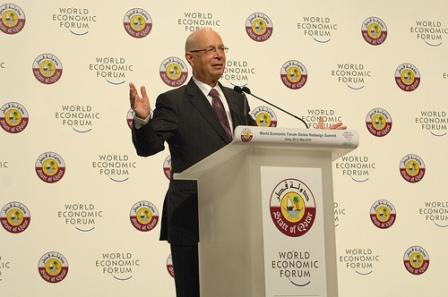|
The World Economic Forum, in partnership with the Government of Dubai, opened the inaugural Summit on the Global Agenda in Dubai on 7 November 2008. The Summit was a unique and timely gathering of the world’s 700 most relevant minds - leaders from academia, business, government and civil society from around the world. Organized by the Forum’s Network of Global Agenda Councils, the Summit provided a platform to share ideas and collaboratively address some of the key issues on the global agenda - with the aim of laying out solutions to some of the most pressing issues.
More than 60 separate Councils addressed issues of global importance with the aim of becoming a “brains trust” for solving major international problems. Some Councils dealt with industry issues including the future of governments, the Internet and the media industry. Other Councils tackled regional and specific country issues. Each Council addressed issues in their particular field of expertise, but also came together to create a formidable problem-solving network.
 Klaus Schwab, Founder and Executive Chairman of the World Economic Forum, officially opened the Summit this evening with H.H. Sheikh Mohammed Bin Rashid Al Maktoum, Vice-President and Prime Minister of the United Arab Emirates and Ruler of Dubai. Klaus Schwab, Founder and Executive Chairman of the World Economic Forum, officially opened the Summit this evening with H.H. Sheikh Mohammed Bin Rashid Al Maktoum, Vice-President and Prime Minister of the United Arab Emirates and Ruler of Dubai.
“The inaugural Summit on the Global Agenda in Dubai is a unique opportunity for the world’s most innovative and influential thinkers to share ideas and collaboratively develop solutions to address some of the most pressing issues on the global agenda,” said Mr. Schwab.

H.H. Sheikh Mohammed told participants that the economic crisis highlights a need for global governmental involvement to protect the interests of the economy and the public. "This crisis has proved that the economy is truly global – and whatever happens in the USA or China will ultimately affect all global markets. It has also proven the importance of interference and assistance of governments in some cases - such as in this case, where a bad situation was prevented from becoming a disaster, and governments proved they looked after the interests of their citizens," said H.H. Sheikh Mohammed.
After three days of intense brainstorming on the most pressing global issues and risks, including how to shape the post-crisis international financial system, members of the 68 Global Agenda Councils, who came to Dubai from over 60 countries, offered assessments of the state of the world in their focus areas and initial outlines of solutions and approaches. The 68 Councils brought together leading experts to tackle some of the key issues facing the world. The full list of all 68 and the make-up of each Council can be found at http://www.weforum.org/pdf/GAC/Final-4_pages_Dubai.pdf. A summary of the findings of each Global Agenda Council is posted on the World Economic Forum’s website, and can be found at http://www.weforum.org/globalagenda/reports. The work of the Councils, which will continue to meet throughout the year, will be taken forward to the Forum’s 2009 Annual Meeting, which will take place in Davos-Klosters, Switzerland, from 28 January to 1 February under the theme “Shaping the Post-Crisis World”.
The Summit on the Global Agenda in Dubai “has enhanced our shared understanding of the state of the world and the complexities of the issues,” said Klaus Schwab. According to Summit Co-Chair Mohamed Alabbar, Member of the Dubai Executive Council and Chairman of Emaar Properties, “the Summit on the Global Agenda in Dubai is among the most path-breaking initiatives undertaken by the modern world.” He added: “As the world’s largest brainstorming event, it is not merely about setting agendas; it is about laying the groundwork towards practical and actionable solutions. We are confident that the deliberations of this Summit will be of immense value to the people of the world for the long term.” Dubai will host next year’s Summit on the Global Agenda, which will take place from 4 to 6 October 2009.
Global Agenda Council on Future of Governments included a Russian expert: Yuri Hohlov, Chairman of the Board of Directors, Institute of the Information Society.

One of the regional Global Agenda Councils was “Future of Russia”. Following the recent shifts in Russia’s leadership, this Council examined the country’s standing as a global player, its position in global governance institutions, revived security concerns in the region and beyond brought about by the recent NATO expansion, conflict in the Caucasus and political instability in neighbouring countries, as well as Russia’s expanding economic interests beyond its borders. To do so it is crucial to understand Russia’s position as a regional player, including its influence in the Balkans, Caucasus and Central Asia and its relationship with the EU, as well as the internal dimensions of Russia’s economic, political and social development, which ultimately shapes its global agenda and foreign policy. The Council was chaired by Lilia Shevtsova, Senior Associate, Carnegie Endowment for International Peace, Carnegie Moscow Center.
For more information about the inaugural Summit on the Global Agenda, please visit www.weforum.org/gac. |

